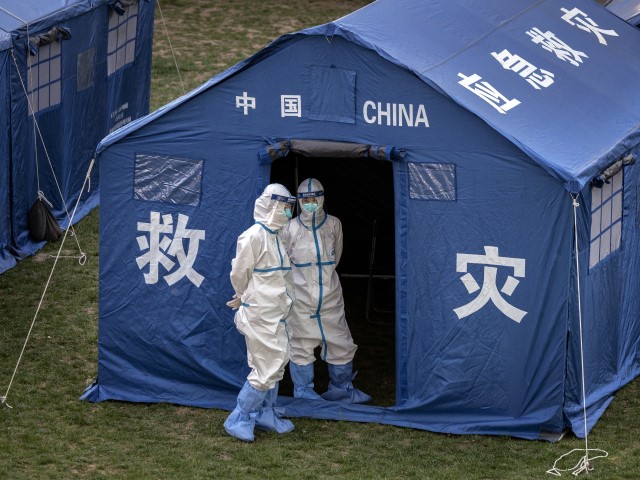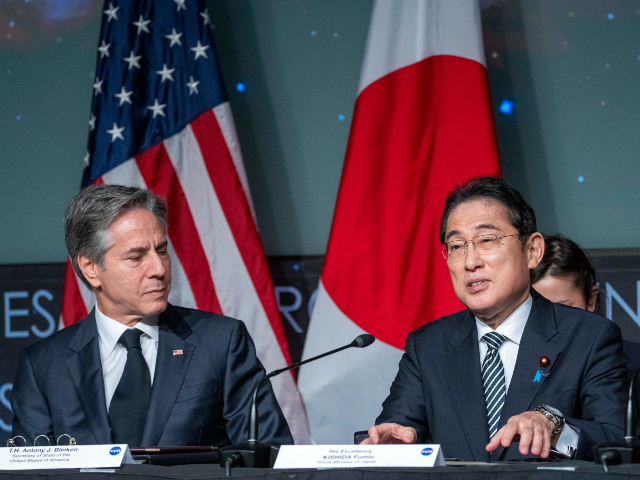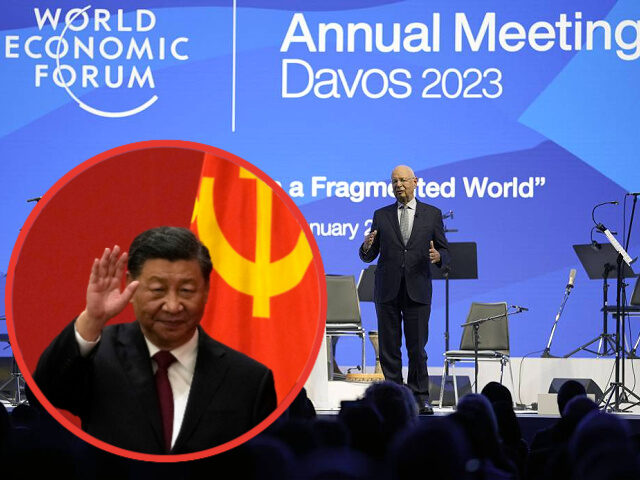Chinese Communist Party propagandists on Monday rushed to embrace the spirit of the World Economic Forum (WEF), held annually in Davos, Switzerland.
According to the country that unleashed the Wuhan coronavirus upon the world, lied relentlessly about the disease, and acted ruthlessly against anyone who questioned Beijing’s fictions, China embraces the same spirit of global cooperation as the WEF.
China’s state-run Global Times on Monday said the WEF being held in person for the first time in three years “marks that the world economy and people’s social lives are gradually walking out of the shadow of the pandemic.”
“As image and voice of China at the WEF always attract high global attention, the world is looking forward to China’s constructive role at a time when global economic risks are intensifying,” the article boasted.
The Global Times briefly mentioned the Russian invasion of Ukraine, which China has steadfastly refused to denounce, as one of those global risk factors, but then whined that the real challenge of our era is that “some countries have repeatedly adopted unilateral policies with an attempt to revitalize their own economies and concepts such as value-based trade and friend-shoring have begun to emerge stimulated by geopolitical tensions.”

Health workers wear protective suits as they stand outside a tent while waiting to perform nucleic acid tests to detect COVID-19 on local workers at a makeshift testing site in Haidian District on April 26, 2022, in Beijing, China. (Kevin Frayer/Getty Images)
In other words, the big problem is that too many countries do not trust the increasingly belligerent genocidal pandemic hothouse running out of Beijing, even though Chinese officials like dictator Xi Jinping are careful to mouth all of the right globalist platitudes when they take a break from planning their next war of conquest to attend forums like the WEF.
The Global Times bizarrely presented China’s fraud-filled train wreck of a coronavirus response as a model for global cooperation — a boast it made two days after Beijing finally gave in to constant pleading from the World Health Organization (W.H.O.) and admitted some 60,000 people have died in the coronavirus wave that began last month:
China has always been the most steadfast practitioner of bridging differences and promoting cooperation. China’s development direction is consistent and its development path stable in recent years. Last year, China convened the 20th National Congress of the Communist Party of China, which drew the blueprint; it held the Central Economic Work Conference, which set the path; it optimized COVID response measures, which brought into play the advantages accumulated in the past three years. Most international organizations and investment institutes have given optimistic projection for China’s economy in 2023. The Chinese economy itself is a bright spot in terms of supporting international cooperation and global recovery. It beams light of hope amid gloom for the struggling global economy in 2023.
Since 1979, China has never missed a WEF. Today, the Davos Spirit with openness and cooperation as core is also resonating with China. The WEF has witnessed China’s opening-up and development in decades. China’s ideals and achievements also made the Davos Spirit more dazzling. At the WEF this year, the world will once again witness that “China’s development is an opportunity for the world,” and we also believe that China will have more like-minded friends at the WEF.
Note that W.H.O. still thinks China is concealing vital data on its coronavirus wave, even after admitting its previous claims of virtually no fatalities were low by a factor of about 20,000. Every international organization knows it must tiptoe very carefully around the Chinese Communist Party’s short temper and urge for secrecy, or else the Chinese government will completely stop cooperating with even the most urgent endeavors. That is not quite consistent with the dazzling “Davos spirit” the Global Times touted on Monday.

Secretary of State Antony Blinken, left, listens as Japanese Prime Minister Fumio Kishida speaks during an event to sign an agreement on space cooperation at NASA headquarters, Friday, Jan. 13, 2023, in Washington. (AP Photo/Alex Brandon)
On Sunday, another Global Times article howled at the United States and Japan for daring to work together on space exploration because the agreement was supposedly infested by an “underlying anti-China color.”
The Chinese paper briefly carped about U.S. Secretary of State Antony Blinken describing China as the “greatest shared strategic challenge” between Washington and Tokyo, but what really infuriated the Global Times was Japan’s new defense policy under Prime Minister Kishida Fumio, which includes closer cooperation with the United States and the biggest military buildup of the postwar era.
According to the Global Times, Japan’s cooperation on space exploration with the U.S. is meant to advance its “vicious goals of developing military forces of an offensive nature in space in the name of protecting space assets and gradually breaking through its Pacifist Constitution.”
“Japan should avoid becoming a U.S. lackey in space, and it should abandon the idea of playing the role of a ‘sharp spear’ in the alliance as the U.S. has given strong support for, as it would go against the post-war promises and hurt the delicate trust of its Asian neighbors, creating chaos and turbulence in the Asia-Pacific region,” the Global Times sneered, using the kind of language that is not usually applauded in Davos.

COMMENTS
Please let us know if you're having issues with commenting.